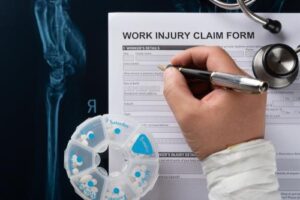
Many American workers wonder whether workers’ compensation covers traveling to and from work. For private, domestic, agricultural, and construction workers alike, it’s common to feel confused about workers’ comp rules, especially when it comes to traveling.
In most cases, no, workers’ compensation does not cover travel to and from work. The “coming-and-going rule” typically excludes coverage for daily commutes. However, there may be traveling situations where an employee is entitled to workers’ comp benefits. An Atlanta work injury lawyer can help you understand those situations and answer your questions.
Workers’ Compensation Benefits Explained by a Lawyer
Workers’ compensation is a program meant to support injured workers after a job-related accident. It offers help with medical expenses, income loss, and other costs related to workplace injuries. Workers in many fields may be covered.
If an injury happens while performing job duties, workers may be able to file a claim for workers’ compensation according to the Georgia workers’ compensation settlement chart. This includes injuries at job sites, during business travel, or while using employer property like a company vehicle. The injury must be linked to the employment duties or done for the employer’s gain.
Workers’ compensation may cover:
- Medical bills related to the injury or illness
- Travel expenses to and from medical appointments
- Emergency travel expenses during work-related trips
- Lost income due to time away from work
- Additional compensation for lasting or serious injuries
- Out-of-pocket expenses tied to treatment
Get the strong arm
The “Going and Coming” Rule in Workers’ Compensation Claims
The “going and coming” rule is often used in workers’ compensation cases when someone is injured during travel. This rule says that injuries during a regular commute are usually not covered by workers’ compensation benefits. A daily drive to or from a job site is seen as personal, not work-related.
Common Situations Where the Rule Applies
- Driving from home to the office or job site
- Walking across public streets or sidewalks before clocking in
- Accidents during an unpaid commute break
- Using personal vehicles for daily travel with no job tasks involved
Understanding this rule can help people make sense of why a claim may be accepted or denied. Workers affected by this rule might also consider speaking with a workers’ compensation lawyer to understand how their job responsibilities and employment contract apply to the situation.
Exceptions to the “Going and Coming” Rule
There are several recognized exceptions to the going and coming rule that may allow a worker to receive compensation benefits after being injured while traveling. Understanding these exceptions can help determine whether your injury may qualify.
Special Errand Exception
If your employer asks you to complete a work-related errand, even if it occurs outside normal working hours or on your way home, it could be covered. For example, picking up supplies or dropping something off for a client at your boss’s request might fall under the special errand exception.
Use of a Company-Owned Vehicle
If you are driving a company-owned vehicle for work-related purposes, even outside regular hours, and are in an accident, your injuries may be covered. The use of employer property, like a company vehicle, suggests that the trip may be within the course of employment.
Traveling Employees
Some workers are required to travel as part of their job duties. Business travelers, salespeople, or employees who visit multiple job sites may be covered while in transit. Injuries that happen during a business trip, on the way to a business meeting, or while attending a business conference may be eligible for a compensation claim.
Remember, this is not an extensive list. If you or a loved one got injured in a job-related travel or commute, you may need to consult an Atlanta workers’ compensation lawyer.
The “Course and Scope of Employment”
For a workers’ compensation claim to be approved, the injury generally needs to occur in the “course and scope of employment.” This legal phrase means the activity must be related to the job, benefit the employer in some way, or happen while the employee is performing assigned duties.
For example, if you are driving to meet a client, attending a business lunch, or carrying out a task that directly helps the business, an injury may fall within the scope of employment. In these cases, the worker may be eligible for workers’ compensation insurance coverage, including help with medical bills, income loss benefits, and even additional compensation for lasting injuries.
However, if the travel was strictly personal, injuries that happen during that time are unlikely to be covered. The difference often comes down to what the employee was doing and whether the employer received a benefit from that activity.
A Lawyer Can Answer All Your Workers’ Compensation Questions
Travel-related injuries can lead to a challenging situation for injured workers. Many people don’t know if they should file a claim, contact the insurance carrier, or seek legal help. A workers’ compensation lawyer can review the details of your accident, evaluate your job duties, and explain whether your injury falls under the course and scope of employment.
If your claim has been denied, or if you’re confused about workers’ comp rules, an experienced attorney can help clarify your next steps. Our work injury lawyer can also take a look into your case to find out whether you are entitled to workers’ compensation benefits after getting injured while traveling. Get in touch with The Strong Arm™ of John Foy & Associates today.
(404) 400-4000 or complete a Free Case Evaluation form





